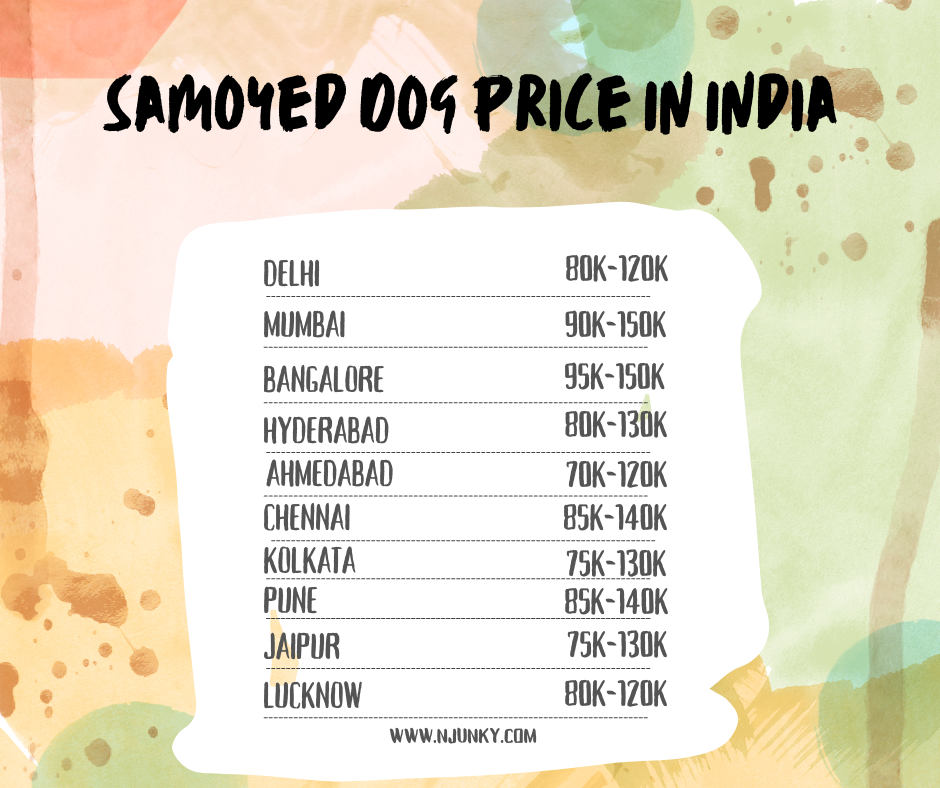Welcome to our comprehensive guide on Samoyed Dog Price in India. If you’re considering bringing home a Samoyed, it’s essential to have a clear understanding of the associated costs. Samoyeds are beautiful, friendly, and energetic dogs that have gained immense popularity among dog lovers in India. In this article, we will explore the factors influencing the Samoyed Dog Price in India and provide you with valuable insights to help you make an informed decision. So, if you’re curious about Samoyed dog prices in India and want to know what to expect when bringing home this charming breed, keep reading!
- Average Samoyed Dog Price In India
- Samoyed Dog Price across different regions in India
- Color variations in Samoyed Dog Breed
- Samoyed dog breed overview
- History of Samoyed Dogs in India
- Factors Influencing Samoyed dog price in India
- Maintenance costs for owning a Samoyed dog
- Where to Buy Samoyed Dog In India
- Common medical problems with Samoyed Dog
- Caring for Your Samoyed Dog:
- Pros and Cons of Owning a Samoyed Dog
- Final Thoughts
- FAQs
Average Samoyed Dog Price In India
When it comes to the average Samoyed dog price in India, several factors come into play. Samoyeds are considered a high-end breed and are in high demand among pet enthusiasts. The price of a Samoyed puppy in India can vary based on factors such as the breeder’s reputation, the lineage of the parents, the quality of the dog, and the location of the breeder.
On average, you can expect the Samoyed dog price in India to range from ₹70,000 to ₹1,50,000 or even more for a purebred puppy. However, it’s important to note that these figures are indicative and can vary significantly depending on the aforementioned factors. Additionally, the cost of owning a Samoyed goes beyond the initial purchase price. It’s crucial to consider ongoing expenses such as vaccinations, grooming, training, and regular veterinary care.
Before making a decision to bring home a Samoyed, it’s essential to do thorough research, visit reputable breeders, and ensure that you are financially prepared for the responsibilities and expenses that come with owning this majestic breed.
Samoyed Dog Price across different regions in India

The Samoyed dog is one of the most popular dog breeds in India, and many people are interested in owning one. However, the Samoyed Dog Price in India can vary significantly depending on where you live. To help potential owners make informed decisions about purchasing a Samoyed dog, we have created a table that details the prices of Samoyed dogs across different regions in India.
| No | Region | Average Samoyed Dog Price (INR) |
| 1 | Samoyed Dog Price In Delhi | 80,000 – 1,20,000 |
| 2 | Samoyed Dog Price Mumbai | 90,000 – 1,50,000 |
| 3 | Samoyed Dog Price In Kolkata | 75,000 – 1,30,000 |
| 4 | Samoyed Dog Price In Chennai | 85,000 – 1,40,000 |
| 5 | Samoyed Dog Price In Bangalore | 95,000 – 1,50,000 |
| 6 | Samoyed Dog Price Hyderabad | 80,000 – 1,30,000 |
| 7 | Samoyed Dog Price In Ahmedabad | 70,000 – 1,20,000 |
| 8 | Samoyed Dog Price Pune | 85,000 – 1,40,000 |
| 9 | Samoyed Dog Price In Jaipur | 75,000 – 1,30,000 |
| 10 | Samoyed Dog Price In Lucknow | 80,000 – 1,20,000 |
| 11 | Samoyed Dog Price In Chandigarh | 85,000 – 1,40,000 |
| 12 | Samoyed Dog Price In Bhopal | 70,000 – 1,20,000 |
| 13 | Samoyed Dog Price In Indore | 75,000 – 1,30,000 |
| 14 | Samoyed Dog Price In Kochi | 90,000 – 1,50,000 |
| 15 | Samoyed Dog Price In Guwahati | 80,000 – 1,30,000 |
Color variations in Samoyed Dog Breed
The Samoyed dog breed is known for its beautiful and distinct coat, which comes in various color variations. While purebred Samoyeds typically have a solid white coat, there are a few other color variations that can occur. Here are some of the common color variations found in Samoyeds:
White: The most recognized and predominant color in Samoyeds is pure white. A pristine white coat is a hallmark of the breed and gives them their iconic appearance.
Biscuit: Some Samoyeds may have biscuit or cream-colored markings on their ears, back, and body. These markings can range from light cream to a deeper biscuit color.
Cream: Cream-colored Samoyeds have a lighter shade of coat, often with a pale cream color throughout their body. This variation may have slightly darker cream or biscuit markings as well.
Biscuit and White: Samoyeds with biscuit and white markings have a combination of white and biscuit-colored patches on their coat. These markings can appear on the ears, face, body, and tail.
Samoyed dog breed overview

The Samoyed is a breed of dog that originated in Siberia, where it was used as a working dog for herding reindeer and pulling sleds. The breed is named after the Samoyedic people, who were indigenous to the area.
Samoyeds are a medium to large breed, with males typically weighing between 50-65 pounds and standing 21-23.5 inches tall at the shoulder, while females typically weigh between 35-50 pounds and stand 19-21 inches tall. They have a distinctive thick, white or cream-colored coat that helps keep them warm in cold weather. The coat is also water-resistant and sheds heavily twice a year.
In terms of temperament, Samoyeds are known for their friendly and outgoing personalities. They are affectionate with their families and often enjoy being around people. They can also be good with children, although as with any breed, supervision is recommended. Samoyeds are intelligent and trainable, but they can be independent-minded and stubborn at times.
Due to their working dog heritage, Samoyeds benefit from regular exercise and mental stimulation. They can do well in a variety of environments, from apartments to larger homes with yards, as long as they receive enough exercise and attention. Samoyeds are generally healthy, although like all breeds, they may be prone to certain health conditions, such as hip dysplasia and eye problems.
Overall, the Samoyed is a beloved breed for its friendly personality, beautiful coat, and working dog heritage. They make great family pets for those who have the time and dedication to provide them with the exercise and attention they need.
History of Samoyed Dogs in India

The Samoyed dog breed has a relatively recent history in India. While the breed has been known for centuries in its native Siberia and has been exported to other parts of the world since the late 1800s, Samoyeds only began to appear in India in the latter part of the 20th century.
It is unclear exactly when the first Samoyeds were brought to India, but it is likely that they were imported by dog enthusiasts and breeders in the 1970s and 1980s. The breed’s thick coat and ability to adapt to colder climates made it a popular choice for those living in the colder regions of India, such as the Himalayan foothills.
Today, Samoyeds are still a relatively rare breed in India, although their popularity has grown in recent years. The Indian Kennel Club recognizes the breed and there are a number of breeders and Samoyed enthusiasts throughout the country. Samoyeds in India are primarily kept as companions and family pets, although some may still be used for sledding or other working dog activities.
Despite their relative rarity, Samoyeds have developed a loyal following in India, thanks to their friendly personalities and striking appearance. Their popularity is likely to continue to grow as more people become aware of this beautiful and unique breed.
Factors Influencing Samoyed dog price in India
The price of a Samoyed dog in India can be influenced by several factors. Here are some of the key factors that can affect the Samoyed dog price in India:
Breeder Reputation: The reputation and credibility of the breeder play a significant role in determining the Samoyed dog price in India. Well-known and reputable breeders who have a track record of producing healthy and high-quality puppies often charge a premium for their dogs.
Pedigree and Bloodline: The lineage and pedigree can also impact the Samoyed dog price in India. Dogs with champion bloodlines or a prestigious ancestry are generally priced higher as they are considered to have superior genetics and conform to breed standards.
Health and Genetic Testing: Responsible breeders conduct health screenings and genetic tests to ensure the overall health and well-being of their puppies. Samoyeds with health clearances and certifications tend to have a higher price due to the added assurance they provide.
Physical Attributes: Physical attributes such as size, conformation, and appearance can influence the Samoyed dog price in India. Dogs that closely adhere to the breed standard, with desirable traits and a well-balanced structure, are often priced higher.
Location: The location of the breeder or seller can impact the Samoyed dog price in India. Samoyed puppies in metropolitan cities or regions with high demand may be priced higher compared to less populated areas where the demand is lower.
Supply and Demand: Like any market, supply and demand can affect the Samoyed dog price in India. If the demand for Samoyeds is high while the supply is limited, prices tend to be higher. Conversely, if there are more available puppies than potential buyers, prices may be relatively lower.
Additional Services: Breeders often provide additional services like microchipping, vaccinations, deworming, and initial training. These services can influence the price of a Samoyed puppy in India.
Maintenance costs for owning a Samoyed dog

The cost of owning a Samoyed dog in India can vary depending on a number of factors, such as where you live, the quality of the dog’s food and care, and whether or not you choose to hire professional services like grooming or training. Here is a breakdown of some of the costs associated with owning a Samoyed in India:
Purchase Price: The initial cost of purchasing a Samoyed puppy in India can vary depending on the breeder, pedigree, and location. On average, a Samoyed puppy from a reputable breeder can cost anywhere from ₹70,000 to ₹1,50,000 or more.
Food: Samoyeds require high-quality dog food to maintain their health and energy levels. The cost of food will depend on the brand and quality you choose, as well as the size of your dog. On average, expect to spend around ₹3,000 to ₹5,000 per month on food.
Vaccinations and Medical Care: Samoyeds require regular vaccinations and medical care to maintain their health. The cost of vaccinations and check-ups will depend on your location and the veterinary clinic you choose, but on average, expect to spend around ₹5,000 to ₹10,000 per year on medical care.
Grooming: Samoyeds have thick, double coats that require regular grooming to prevent matting and tangles. Grooming costs will depend on whether you choose to groom your dog yourself or hire a professional groomer. On average, expect to spend around ₹1,000 to ₹2,000 per month on grooming.
Miscellaneous Costs: Other costs associated with owning a Samoyed in India can include toys, treats, and other supplies. Expect to spend around ₹1,000 to ₹2,000 per month on miscellaneous costs.
You May Also Like
Where to Buy Samoyed Dog In India
When looking to buy a Samoyed dog in India, it is crucial to choose a reputable source to ensure the health, well-being, and authenticity of the breed. Here are some reliable options to consider:
Reputable Breeders: Contacting reputable Samoyed breeders is one of the best ways to find a healthy and well-bred Samoyed puppy. Look for breeders who have a good reputation, are involved in breed clubs or organizations, and prioritize the health and welfare of their dogs.
Kennel Clubs: Kennel clubs such as the Kennel Club of India (KCI) can provide information and contacts for registered breeders in your area. They maintain a list of recognized breeders who follow ethical practices and breed according to breed standards.
Dog Shows and Events: Attend dog shows, exhibitions, and events where Samoyeds are showcased. This provides an opportunity to meet reputable breeders, see the dogs in person, and make informed decisions.
Online Platforms: Online platforms, such as websites and forums dedicated to dog sales, can provide listings from reputable breeders. Ensure you thoroughly research and verify the credibility of the breeder before making any commitments.
Common medical problems with Samoyed Dog

Like all breeds, Samoyed dogs can be prone to certain medical problems. Here are some common health issues that Samoyed owners should be aware of:
Hip Dysplasia: This is a condition where the hip joint does not develop properly, leading to arthritis and mobility issues. It is a genetic condition that can be exacerbated by factors such as obesity and over-exercise.
Progressive Retinal Atrophy (PRA): This is a degenerative eye disease that can lead to blindness. It is a genetic condition that can be identified through DNA testing.
Hypothyroidism: This is a condition where the thyroid gland does not produce enough hormones, leading to a variety of symptoms such as weight gain, lethargy, and skin issues.
Samoyed Hereditary Glomerulopathy (SHG): This is a genetic kidney disease that affects some Samoyeds. It can lead to kidney failure and other related health problems.
Von Willebrand Disease (VWD): This is a genetic bleeding disorder that can cause excessive bleeding after injury or surgery.
Allergies: Samoyeds can be prone to allergies, which can manifest as skin problems and digestive issues.
Bloat: This is a potentially life-threatening condition where the stomach twists on itself, cutting off blood flow and leading to shock.
Caring for Your Samoyed Dog:

Caring for your Samoyed dog involves providing them with proper nutrition, grooming, exercise, training, and regular veterinary care. Here are some essential aspects to consider when caring for your Samoyed:
Nutrition:
Feed your Samoyed a balanced and high-quality diet that meets their nutritional needs. Consult with your veterinarian to determine the appropriate portion sizes and feeding schedule based on your dog’s age, size, and activity level.
Grooming:
Samoyeds have a dense, double coat that requires regular grooming to keep it clean and prevent matting. Brush your Samoyed’s coat at least two to three times a week, and more frequently during shedding seasons. Regular grooming also helps to maintain their coat’s natural shine and remove loose hair.
Exercise:
Provide regular exercise and mental stimulation for your Samoyed. They need daily physical activity such as walks, playtime, or interactive games to keep them mentally and physically engaged. Samoyeds have an active nature and enjoy activities like hiking, running, or playing in a securely fenced yard.
Training and Socialization:
Start training and socializing your Samoyed from a young age. They are intelligent and eager to please, making them responsive to positive reinforcement training methods. Enroll in puppy training classes to teach them basic obedience commands and proper behavior. Socialization is important to expose them to different environments, people, and animals, helping them become well-rounded and confident dogs.
Veterinary Care:
Schedule regular veterinary check-ups for your Samoyed to monitor their overall health, vaccinations, and preventive care. Keep up with their vaccination schedule, deworming, and flea/tick prevention. Regular dental care, such as teeth brushing or dental treats, is also important for their oral hygiene.
Temperature Regulation:
Samoyeds have a thick double coat that helps them tolerate cold climates but makes them sensitive to heat. Ensure they have access to shade and fresh water during hot weather. Avoid leaving them in hot or humid conditions for extended periods.
Mental Stimulation:
Engage your Samoyed’s mind with puzzle toys, interactive feeding devices, and training sessions. Samoyeds are intelligent dogs that require mental stimulation to prevent boredom and unwanted behaviors.
Bonding and Affection:
Samoyeds thrive on companionship and love to be part of their family’s activities. Spend quality time with your Samoyed, provide them with attention and affection, and include them in your daily routines to strengthen your bond.
Pros and Cons of Owning a Samoyed Dog

Samoyed dogs are a beautiful, fluffy breed that have captured the hearts of many dog enthusiasts. These friendly and loyal dogs are known for their playful nature and love for their human companions. However, before deciding to bring one into your home, it’s important to consider both the pros and cons of owning a Samoyed
Pros:
- Friendly and Social: Samoyeds are known for their friendly and sociable nature. They typically get along well with people, including children, and are generally welcoming to strangers. They make excellent family pets and are known for their gentle temperament.
- Playful and Energetic: Samoyeds have a playful and energetic personality. They enjoy physical activities such as running, hiking, and playing fetch. Their enthusiasm for outdoor adventures can make them great companions for active individuals or families.
- Intelligent and Trainable: Samoyeds are intelligent dogs that are quick to learn and respond well to positive reinforcement training methods. With consistent training and socialization, they can become well-behaved and obedient pets.
- Adaptable to Various Environments: Samoyeds can adapt to various living conditions, including apartments or houses with small yards, as long as they receive sufficient exercise and mental stimulation. Their adaptable nature makes them suitable for a range of lifestyles.
- Low Barking Tendency: Compared to some other breeds, Samoyeds have a relatively low tendency to bark excessively. While they may vocalize to alert their owners, they are not known for incessant barking, making them suitable for noise-sensitive environments.
- Beautiful and Soft Coat: Samoyeds have a stunning, fluffy white coat that is both beautiful to look at and soft to touch. Their double coat provides insulation and protects them from harsh weather conditions.
Cons:
- High Grooming Needs: One of the main challenges of owning a Samoyed is their high grooming requirements. Their thick double coat requires regular brushing to prevent matting and keep it clean. They also shed heavily twice a year, requiring extra attention during those periods.
- Moderate Exercise Requirements: Samoyeds have moderate exercise needs and thrive with daily physical activity. Failing to provide them with sufficient exercise and mental stimulation can lead to behavioral issues or restlessness.
- Prone to Separation Anxiety: Samoyeds are a breed that forms strong bonds with their owners. They can be prone to separation anxiety if left alone for extended periods. They thrive in homes where there is consistent human companionship or where measures are taken to minimize their alone time.
Final Thoughts
In conclusion, Samoyed dogs are a wonderful breed known for their loyal, friendly, and energetic nature. They require proper care, attention, and a healthy lifestyle to thrive and live a long and happy life. From providing them with balanced nutrition, regular grooming, and exercise, to training and socialization, and regular veterinary care, there are several aspects to consider when caring for a Samoyed. However, the love, companionship, and joy they bring to their families make it all worthwhile. With proper care and attention, your Samoyed can become your faithful and beloved companion for many years to come.
FAQs
What is the temperament of a Samoyed?
Samoyeds are known for their friendly and outgoing personalities. They are affectionate and loyal to their families, but can also be independent and stubborn. They are generally good with children and other pets.
Do Samoyeds shed a lot?
Yes, Samoyeds have a thick, double coat that sheds heavily twice a year. Regular grooming and brushing can help manage shedding, but it is a significant factor to consider before getting a Samoyed.
Are Samoyeds good with children?
Yes, Samoyeds are generally good with children and make great family pets. They are playful and gentle with kids, but like all dogs, should be supervised around young children.
Are Samoyeds good apartment dogs?
Samoyeds can adapt to apartment living as long as they get enough exercise and mental stimulation. However, their thick coat makes them better suited to cooler climates, and they require daily exercise and playtime.
What category of dog is a Samoyed?
The Samoyed belongs to the working dog category. They were originally bred by the Samoyede people of Siberia for herding reindeer, pulling sleds, and guarding their nomadic camps.
Is Samoyed a rare breed?
Samoyeds are not considered a rare breed. They are popular and well-known in many parts of the world, including India. However, the availability of Samoyeds may vary in different regions and from breeder to breeder.
Is a Samoyed dog a wolf?
No, a Samoyed dog is not a wolf. Samoyeds are domesticated dogs, specifically bred for companionship and working purposes. They have been selectively bred for generations to exhibit specific traits and characteristics that differentiate them from wild animals like wolves.
Can Samoyed survive in India?
Yes, Samoyeds can survive in India. However, due to their thick double coat, they may be more suited to colder climates. Samoyeds can adapt to various environments and living conditions as long as they receive proper care, regular grooming, and adequate exercise.
What is the price of Samoyed in Punjab India?
The price of a Samoyed in Punjab, India can vary depending on various factors such as the breeder’s reputation, the quality of the dog, and the lineage. On average, the price of a Samoyed in Punjab can range from around ₹70,000 to ₹1,50,000 or more for a purebred puppy. It’s important to do thorough research, visit reputable breeders, and consider the associated costs of owning a Samoyed before making a purchase.
Average lifespan of Samoyed Dog
The average lifespan of a Samoyed dog is between 12 to 14 years. However, some Samoyeds may live longer if they are well-cared for and live a healthy lifestyle. Genetics, diet, exercise, and veterinary care can all impact a Samoyed’s lifespan. It is important for owners to provide their Samoyeds with regular veterinary check-ups, a balanced diet, and plenty of exercise and mental stimulation to help them live a long and healthy life.



